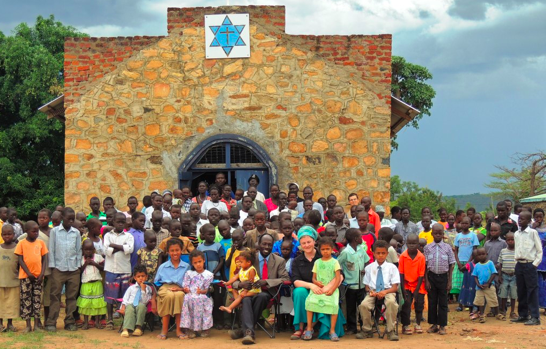It was so good to hear Jon’s voice on April 10, 2014 he was upbeat and honest about how busy they have been, stating over and over how he has his struggles and burdens, but how much he loves it there & that God is good through it all!
SURVEYING THE LAND - They have been very, very, busy, spending extensive hours each of the past 8 days doing necessary survey work on the farm (Arco) with a gentleman, named Brian McKay, who is a part of the team that went over in March. Jon says that every day they tromp over miles of farmland, which he says is massive and so beautiful, and he hopes will one day be the place of his future home. They had almost completed walking the outer boundary after all these days and now they will spend another week or more, walking it yet again, pounding boundary stakes in as they go. He said, “I am not complaining mind you. I absolutely love it. I feel like I’m back in Disaster Relief Training, as we’re in the wilderness, miles from the nearest person, with a 40 lb. back pack trekking in and out daily. Brian has been training Jonathan and another young man, to use the surveying equipment asking them to lead the way and figure it out.
BRICK PRODUCTION has waned because of the current political upheaval in the north of South Sudan and it’s effect on economic development, but Jon said they recently made some contacts that were interested in bricks. PRAYing for the Lord, to order this, bringing forth business and the the provision for needed materials and all that is needed to go forward.
They were not able to purchase DRIP IRRIGATION SYSTEM before heading to South Sudan, but Jon feels that is God ordering their steps as the surveying is consuming alot of their time and the wet season is starting.
He asked us to PRAY that God would provided for three things:
1.) The training course he & Roger want to take June 22-27. EQUIP International in NC. offers a week long intensive called Farming God’s Way, taught by missionaries who have farmed and methods of drip irrigation in 3rd world countries, in hopes that he can learn more about it before he returns in late summer or early fall, as the Lord leads.
Farming God's Way/Intro to Foundation for Farming This is a course in which the principles Foundations for Farming and Farming God's Way begun by Brian Oldreive in northern Zimbabwe will be presented... The use of various forms of drip irrigation will also be discussed. While these methods will be covered, basics in agriculture will be the emphases for the class because it is of vital importance to understand the nutritional needs of plants and the conditions needed for them to flourish. The participant will leave with a better understanding of not only how to grow food, but also how to integrate the information into a method of Christ-centered discipleship.
Farming God's Way/Intro to Foundation for Farming This is a course in which the principles Foundations for Farming and Farming God's Way begun by Brian Oldreive in northern Zimbabwe will be presented... The use of various forms of drip irrigation will also be discussed. While these methods will be covered, basics in agriculture will be the emphases for the class because it is of vital importance to understand the nutritional needs of plants and the conditions needed for them to flourish. The participant will leave with a better understanding of not only how to grow food, but also how to integrate the information into a method of Christ-centered discipleship.
2. The needed DRIP IRRIGATION equipment to set up a trial area of the farmland before the dry season in October.
3.) PRAY also for more permanent workers on the farm (Jon would like to be one of them) as they need dedicated people to work the farm on a regular basis.
Jon also finds that people come to him for basic medical attention and as Robert Kirkman said, First World medical training does not adequately equip you for the needs presented to them in South Sudan and he has a background as an EMT. Jon and Robert Kirkman hope to be in the US for the late October(19 - 31) Missionary Medical course through EQUIP International so they can be more appropriately equipped to help as needs arise. Thank you for PRAYING for the Lord to order their steps and provide, so they can follow through on this training.
MMI is a two-week course designed to equip missionaries with diagnostic skills and appropriate treatments. MMI enables the missionary to do physical exams, and to process the information gathered to come up with an accurate diagnosis, and a recommended treatment.
Something to PRAY for is on Wed. evenings, William has begun a discipleship course of FOUNDATIONS IN THE FAITH & the Word & lots of people are coming. The need for a strong foundation is great in a country that has been ravaged by war & families surviving in refugee camps. Now God has them in a more stable place where they can grow in Him.
We will be setting up a speaking itinerary for after Jon returns, Memorial Day, May 26. If you would be willing to have us, as a family or with William & his family, to share at your church or if you would be willing to host us sharing with some of your friends in your home, please let us know!
In him Who keeps us, Roger, Patty & Emma
PS. We happened to call last night (4/14) to ask William a question and Jon answered and said a number of things had happened to make it a particularly difficult day. So thank you for your continued prayers for all there in Borongole. So thankful we could pray with him and entrust all into God’s sovereign care. www.operationsnehemiah.org











